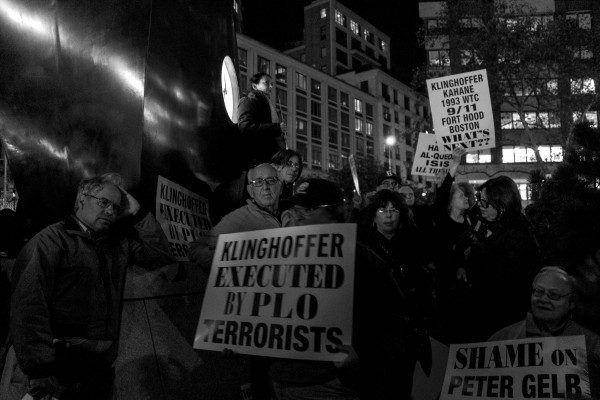Has Anti-Semitism Become Accepted?
November 6, 2014

In the past few months, the world has seemingly reached its most disastrous and terrifying points, given headlines such as the beheadings of three captives by the Islamic State of Iran and Syria (ISIS), the outbreak of Ebola and the Israeli-Palestinian conflict in the Middle East. Though the Israeli-Palestinian conflict has simmered slightly since this past summer, its consequences are still raging. Anti-Semitism has been on the rise during these several months all over the world, most notably in the rallies in Germany and Britain. Slogans such as “Death to Israel” have become popular, and acts eerily reminiscent of Europe in the early 1940s, such as the burning of the Israeli flag and the looting of Jewish-owned stores, have become rampant.
In New York City, the most recent case of anti-Semitism has been in regards to the controversial opera, “The Death of Klinghoffer,” which is currently being performed at the Metropolitan Opera House (Met). Critics have stated that the opera glorifies terrorism and the murder of a Jewish-American cruise ship passenger, Leon Klinghoffer. The controversy behind this opera stems from the music and overall dangerous language which lionize terrorism. A writer for The Algemeiner, a prominent Jewish newspaper in America, expressed his disdain for the opera: “The Palestinian chorus is beautifully composed musically […] The Jewish chorus is a mishmash of whining about money, sex, betrayal and assorted ‘Hasidim’ protesting in front of movie theaters. The goal of that narrative chorus is to compare the displacement of 700,000 Palestinians—some of which was caused by Arab leaders urging them to leave and return victoriously after the Arabs murdered the Jews of Israel—with the systematic genocide of six million Jews. It was a moral abomination.”
There is a fine line between being anti-Israel, and anti-Jewish, and “The Death of Klinghoffer” has crossed it. The combination of the score inadequately written for the characters of the Jewish monologues, the legitimization of the murder of Leon Klinghoffer, and the rationalization for the acts of the terrorists amount to anti-Semitism. There are those who can justify the opera in the name of free speech—but that very same right was not given to protesters outside of Lincoln Center, whom the Met sought to silence by not allowing the show-goers to listen to the demonstration. The show-goers were quickly ushered in, only delaying the start of the opera by several minutes.
Hitting even closer to home, anti-Semitism has been on the rise among college campuses as well. On Oct. 24, Fordham received anti-Semitic fax messages, and though they have been labeled as political speech and not hate crimes, it still shows that there may be members of the community harboring hate for the Jewish population at Fordham. Instead of furthering the education about the erroneous roots of anti-Semitism, Fordham has experienced a major setback. The American Studies Department at Fordham, though it has not supported the larger decision made by the American Studies Association (ASA) to boycott Israeli colleges and universities, has not denounced it either. Though the ASA supposedly promotes the right to freedom of expression and thought, it has proved otherwise. The boycott is blatantly anti-Semitic for several reasons, but perhaps the most telling is that the ASA defends its boycott by arguing that it wishes to participate in a “deeper engagement” with international scholars across the Middle East. Yet, it excludes Israel from such discussions. Though the Palestinian-led boycotts of Israeli institutions are driven to initiate reform within the Palestinian community, such as a need for stronger education and rebuilding of infrastructure that was bombed by Israeli troops, the larger political reason hovering above these campaigns is rooted in anti-Semitism. In 2005, for example, the Boycott, Divestment and Sanction Movement (BDS Movement) joined together with Hamas and the Popular Front for the Liberation of Palestine to call for the elimination of Israel, rather than improving the governmental situation in Palestine. Furthermore, Israel is one of the most highly advanced, democratic countries, that has contributed enormously to the understanding of science, history and medical research. To boycott such a state is unfair and unwise to say the least. Why not boycott Iranian institutions since Iran has an intensive, well-known, nuclear program? Or perhaps, why not call for a boycott of China, for its Communist ties and obvious lack of freedom of speech and political expression?
Another unfathomable product of the rise of anti-Semitism was the hashtag that was created on Twitter over the summer: “Hitler was right” The hashtag eventually waned, but Twitter failed to remove it or give a public statement undermining the authority of that phrase.
When events like these hit home, both in the Fordham community and in my own life as a Jewish student, I would like to know that I am able to seek comfort among my peers. I do not want to feel the helplessness I experienced several months ago when my friend told me that his temple was defaced with swastikas during the height of the Israeli-Palestinian conflict. I would like to be able to wear my Star of David in public places without feeling like I’m being judged for it. I would like to be able to use my freedom of religion without feeling pressured to label myself as pro-Israeli or pro-Palestinian. The Jewish community should do more to stand up for itself and more importantly, educate the Fordham community about the conflict in the Middle East. The major setback with regards to the Middle East especially is that people fail to check the facts before drawing a conclusion. Of course, there will always be bias, but the best we can do as Jewish students and as a community at large is to raise awareness about anti-Semitism and do our best to stop the hatred from culminating.












